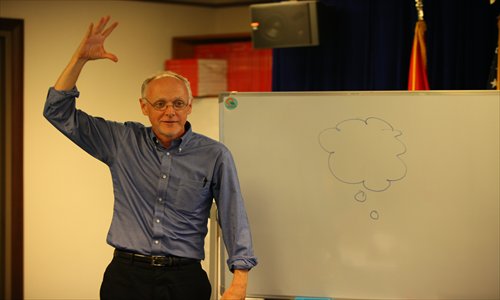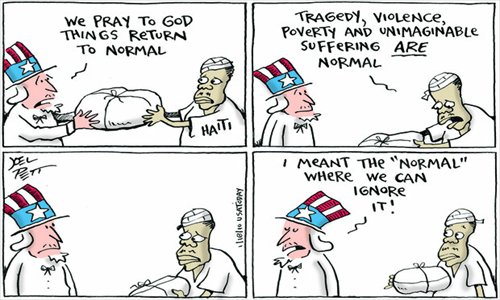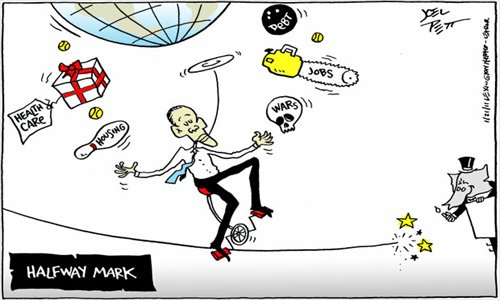Quick on the draw

The American editorial cartoonist Joel Pett once said that everybody draws during their childhood; the only difference with him is that he didn't stop. And today his passion for drawing is undiminished. Born in 1953, he graduated from Indiana University, and has worked for the Lexington Herald Leader since 1984. He rose to fame when he won the Pulitzer Prize for editorial cartooning in 2000 (he was a finalist twice before).
"What drives me to draw is anger and dissatisfaction with the human race," he told the Global Times during his short stay in China as a guest of the US Consulate General in Shanghai. "We have the incredible brains to make machines, but we still have wars, pollution and all the terrible things that we do to each other in the name of progress or competition, which almost drives me crazy. One of the attributes of writing satire is that you develop a strong sense of how unfair the world is."
In Pett's nearly 40-year-long cartooning career, his works have been seen in hundreds of influential newspapers and magazines in the US including The New York Times, The Washington Post and the Los Angeles Times.

Politics isn't funny
Although Pett believes that the golden age for political cartoons was back in the 1940s, he still finds his job amazing. "Political cartoons are supposed to make you think, make you mad, or something; it is not supposed to be funny - funny is not the point," he said.
In Pett's cartoons, an often-arguing American couple remains among his signature characters, symbolizing a typical American family. It includes an "uncle Sam" husband wearing a "star-and-stripes" top hat and his wife depicted as the Statue of Liberty. "Just as the government and 'freedom' are often on opposing sides of debates, so I have my little domestic couple who always argue about a lot of issues," he said.
Under Pett's pen, five American presidents - Ronald Reagan, George H. Bush, Bill Clinton, George W. Bush and Barack Obama - have been his subjects. "It's rude, but also fun to draw powerful people," he said.
When the Reagan administration cut off US funds to the United Nation's family planning program (for birth control in Africa and other underdeveloped areas), the news upset the cartoonist. He drew a cartoon in which planet Earth was depicted as an ovum with many sperm - in the guise of Reagan - swimming towards it.
2012 may be a presidential election year, but Pett is not overly excited. "It's easy to get distracted, because there are election stories every day. But it's not that important. What interests me are all those things that are not campaign issues, such as the world food crisis, African issues and labor in Chinese factories," he said.
In Pett's eyes, the most challenging thing is to "draw something nobody else is talking about." And the Internet helps him access these important, but less-talked, issues around the world including population concerns, female education, oceanic pollution, energy problems and housing crises.
"The basic element of a successful cartoon is simplicity," Pett said. He describes the process of creating a cartoon as akin to journalism - collecting information, double checking facts, zeroing in on a certain point and then illustrating it in the simplest way possible. "You write and write, and then edit and edit to make it simpler, smarter and more understandable," he said.
Pett said that sometimes a particular image jumps into his head and, if not, he resorts to drawing "sequential talking heads," in his words. "Thank goodness for the deadline, when every day 4 o'clock comes around, whatever I've got is what I've got!" he said. He jokingly admits "the lack of good idea happens to me all the time."

Awards and criticism
By his own admission, everything changed for Pett after he won the Pulitzer Prize.
"Although it's a system that has benefited me greatly, the whole idea (of the Pulitzer Prize) of picking one person every year, to me, is stupid. However, the lesson in this is that just because the system benefits you, it doesn't make it a good system - just like the financial system in the US," he said.
Pett receives a lot of criticism from readers, sometimes from business people but, interestingly, never from politicians. "Business people are the really powerful people in the world. Sometimes if you start to go against them, they will pressurize your publishers and advertisers, and think of all kinds of ways to make your life difficult," said Pett. "But my solution is more cartoons!
"Smart newspapers recognized first of all that there is an obligation, beyond money, for freedom of the press; secondly, it's not really bad for business. What's bad for business is to do something that is so bland that nobody wants to read it. And people that hate me pay just as much for the paper as people who like me," he said.
Pett first came to China 15 years ago and he points out that the Chinese editorial cartoon industry is much like that in the US.
"It's easy to waste opportunities on things that are not very important," he said. "If you just look at the big stories of the day, it's never about child brides, or wars, or educating girls or polluting the ocean. You know, the big story of the day is often about sports and celebrities. We fall into that trap, and so do the Chinese. But I was impressed by some cartoons I saw in Xi'an that were touching and important."